Jennifer Hyman is not a fashionista.
She’s a tech visionary. When you learn that she’s the CEO and co-founder of Rent the Runway, you might confuse her for someone in the world of high fashion. After all, Rent the Runway deals in expensive designer attire and the company name sounds like the title of a reality TV show you might see on Bravo.
But Hyman doesn’t spend her days pondering whether rompers will be in style next year.
She’s the 37-year-old head of a multimillion-dollar fashion technology company that has raised more than $190 million to date—more money than any other female-run business in the U.S. (Less than 3 percent of venture capital dollas went to companies with women in charge in 2016.) Hyman’s biggest concerns are how she’ll land the next round of funding and how to change the way people shop—or don’t—for clothing.
Related: How Tala Raassi Found Freedom Through Fashion
Rent the Runway allows women to rent designer dresses and accessories for weddings, cocktail parties and run-of-the-mill date nights. Instead of dropping thousands of dollars on a high-fashion dress for your college acquaintance’s swanky New York City nuptials, you can rent it at a fraction of the cost through Hyman’s site and five stores. It’s a way to always have a different dress for every new occasion (and photo op) without actually owning any of them. With 8 million members and a service aimed at working professionals, Rent the Runway is upending the way women view their wardrobes.
Personally, Hyman has been more than just a pioneer in the industry. She’s been a social crusader, hiring women executives, running an incubator for women-owned businesses and speaking candidly about her experience with sexual harassment by an investor. She’s savvy, with an MBA from Harvard Business School and the ability to simultaneously envision new markets and alter consumer behavior while managing a massive logistical operation and raising venture capital.
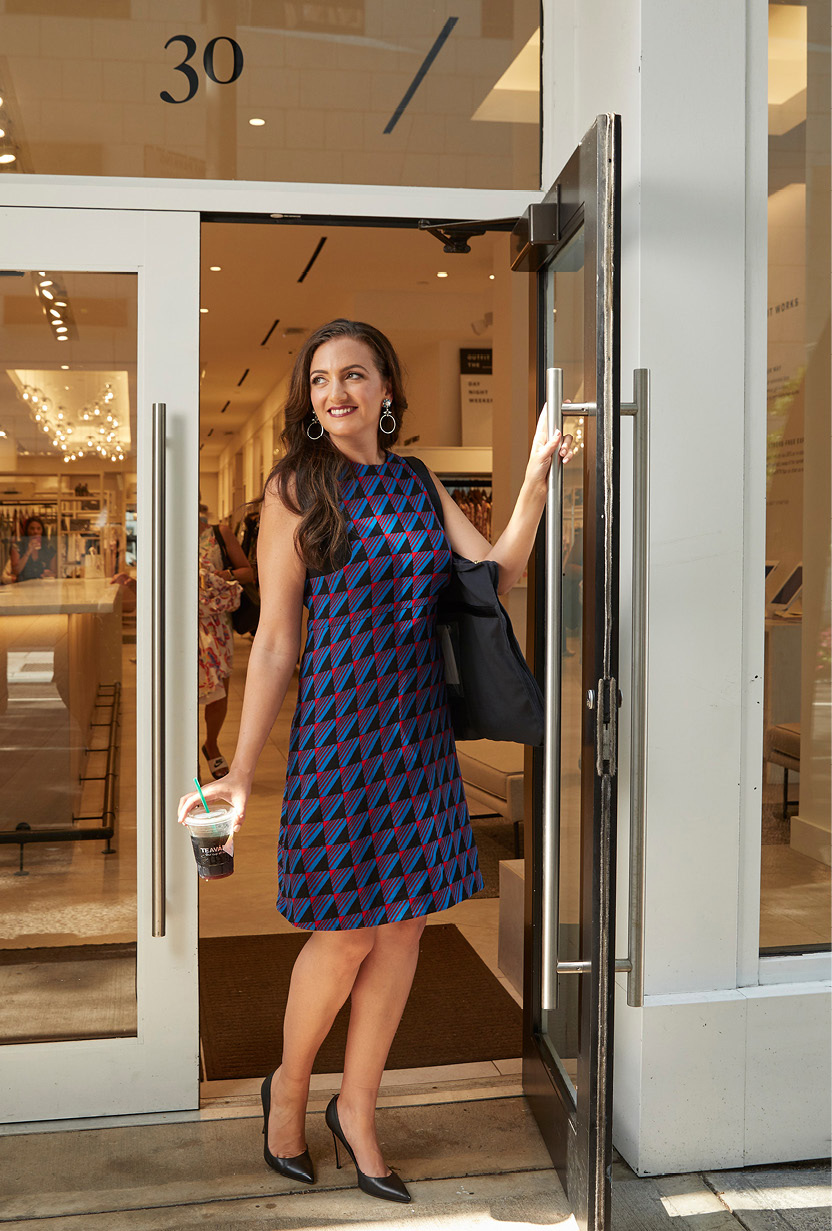
ROBERT ASCROFT
And if you need further proof that she’s a tech CEO and not a style-obsessed trendsetter, Hyman apparently eats some form of pasta five nights a week. While we’re chatting in her office, a crowded space in the Hudson Square neighborhood of New York City, I ask her about it.
“I’m obsessed,” she says. “I’m totally obsessed with Italian food and Mexican food. I feel like pasta is my…” She pauses, thinking about the best way to describe this particular affinity. “What’s it called?”
“Comfort food?” I offer.
“No,” Hyman says. “It’s beyond my comfort food. It’s my like… energy food. When I feel like the day is great? Pasta. When I feel like I want the day to be great? Pasta. It’s just awesome.”
Few in the fashion world would confess to this kind of carb consumption. But Hyman doesn’t drink kale smoothies or count calories. She indulges in tagliatelle, tortellini and cannelloni.
“This company is fundamentally about changing your relationship with your closet.”
Creative Curator
The Rent the Runway flagship store, a few blocks from Union Square in Manhattan, is a dress-lover’s dream. The décor is minimalist. Nearly all of the walls and shelves are a crisp white or light gray. Gowns from designers like Badgley Mischka, Trina Turk and Jay Godfrey pop out against the pristine setting with bursts of color. The red, magenta and pink dresses are housed in one section; the royal blue, aqua and turquoise dresses in another. Flipping through them, each gown is more stunning than the one before. It’s hard not to want them all.
The store, like the business, is carefully curated and organized, with nothing done by accident and each detail accounted for. A mirror in the back has an electronic message above it that switches from “I got it from my mama” to “Objects in the mirror are as fabulous as they appear” to “When your reflection stops you in your tracks.”
As she shows up to the flagship store with an iced coffee in hand on the morning of my visit, Hyman seems cheerful and energetic. She chats casually with the young saleswoman working that day. Hyman, who is tall with olive skin, a warm smile and thick, dark brown hair, seems genuinely curious about the employee’s life. Hyman learns the woman recently moved to New York from the South and is studying fashion merchandising. Brooke Brown, the chief product officer and a founding team member, says Hyman likes to experience every aspect of the business up close. It’s not rare for Hyman to take a customer service call or pick up a retail shift.
Hyman’s predilection for detail and intention has been there since the very beginning, when she stood in her sister’s closet in 2008 and had an epiphany.
Her sister, Becky Leader, was 25 and had just spent what Leader says was “a huge portion of my salary” on a Marchesa Notte dress for her first post-college wedding in New York City. Hyman looked through her sister’s closet. She asked her why she didn’t just wear one of the other fancy dresses she already owned.
“This was when Facebook was really big and you didn’t want to be photographed in the same outfit more than once,” Leader recalls.
That comment became the spark behind what would become a cultural shift in how we view our closets.
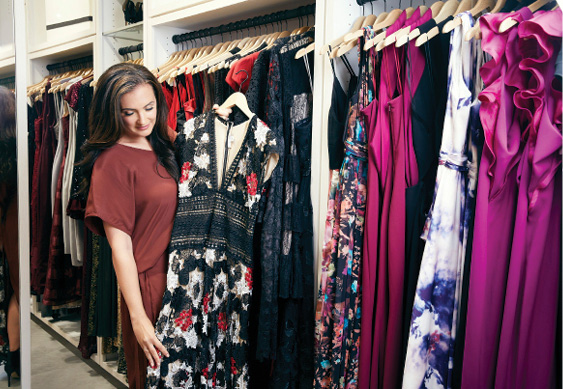
ROBERT ASCROFT
“I had a light bulb moment that we weren’t actually talking about the dress,” Hyman says. “That’s not what she cared about. She cared about walking into the party, feeling beautiful, feeling self-confident. And she actually cared about the photograph that would exist afterward that would show all of her friends how awesome she looked at the wedding. So really it was thinking through, Why can’t we have clothing that we only wear once?”
This was a Saturday night. Hyman met with her classmate and later co-founder Jenny Fleiss, the following Monday. Hyman shared the idea with Fleiss, who decided it sounded fun and wanted to work on it. (Fleiss recently left Rent the Runway to lead Code 8, a part of Wal-Mart’s tech incubator Store No. 8. She will remain on Rent the Runway’s board.)
The duo sent a cold email to Diane von Furstenberg that same afternoon. The designer agreed to meet with them.
“And the next day, we were walking into her office and introducing ourselves as the co-founders of Rent the Runway,” Hyman says.
Power Player
In a culture that rents everything from homes to cars and offers subscriptions for everything from music to fitness, the concept of renting clothing wasn’t necessarily groundbreaking. Some people had even tried it and failed.
“I think a lot of people might’ve and probably did have the idea of renting clothes before me.I was the only one who was crazy enough to attempt it.”
As Hyman eats a late lunch in her office—a quinoa bowl and Smartwater—she contemplates why nobody succeeded renting clothing on a large scale before.
“I think a lot of people might’ve and probably did have the idea of renting clothes before me,” she says. “I was the only one who was crazy enough to attempt it.”
Related: Jennifer Hyman on Taking Risks for Something You Believe In
Running a business like Rent the Runway entails what Hyman calls “just-in-time reverse logistics of physical inventory.” Which means that 100 percent of the inventory that gets returned from customers must be dry-cleaned, quality-controlled, inspected and ready to be sent out to new customers that same evening. Launching Rent the Runway meant creating massive amounts of custom software, logistical processes and algorithms built from scratch.
Hyman is disrupting fashion, but everything still comes down to technology.
From a customer standpoint, it works like this: You select the dress in the size you want (with a free backup size), and it gets sent to you in either a four- or eight-day window. Once you ship the dress back, Rent the Runway cleans it, repackages it and sends it along to the next customer. There are only a few brick-and-mortar locations, so most of the time you can’t try it on before renting it, but users leave detailed reviews about the fit of each dress so a customer has as much knowledge as possible about whether a certain style is right. With Unlimited, the company’s subscription service, users can rent four items at a time and switch them out as many times as they’d like for $159 per month. Customers on a stricter budget can partake in the company’s new service, Rent the Runway Update, which allows them to rent four items a month for $89.

ROBERT ASCROFT
Hyman refers to high-quality dresses and items of clothing as pieces, equating them with works of art you’d have in a collection. Rent the Runway doesn’t aim to replace purchasing what Hyman calls basics like jeans, white T-shirts and leather jackets. They aim to replace what she calls unique statement pieces. Their biggest competitors, she says, aren’t high-fashion designers—they are partnered with one Neiman Marcus and have a Rent the Runway shop within the department store—but rather stores that offer variety at an inexpensive price point, such as TJ Maxx, H&M and Zara. The quality is lower at those places, but customers can still buy several pieces of clothing at a time without going broke. Hyman would rather see people spend that money to get access to a larger selection of nicer clothing.
“It’s a matter of taking the investment pieces that you buy and pairing them with your subscription to fashion, so you have hundreds of thousands of options,” she says.
Seventy percent of Rent the Runway’s workforce is female, as is the vast majority of its leadership. In addition to Hyman as the CEO, the company has women in the posts of chief financial officer, chief operating officer, chief product officer, general counsel and as the heads of retail, subscription, merchandising and planning.
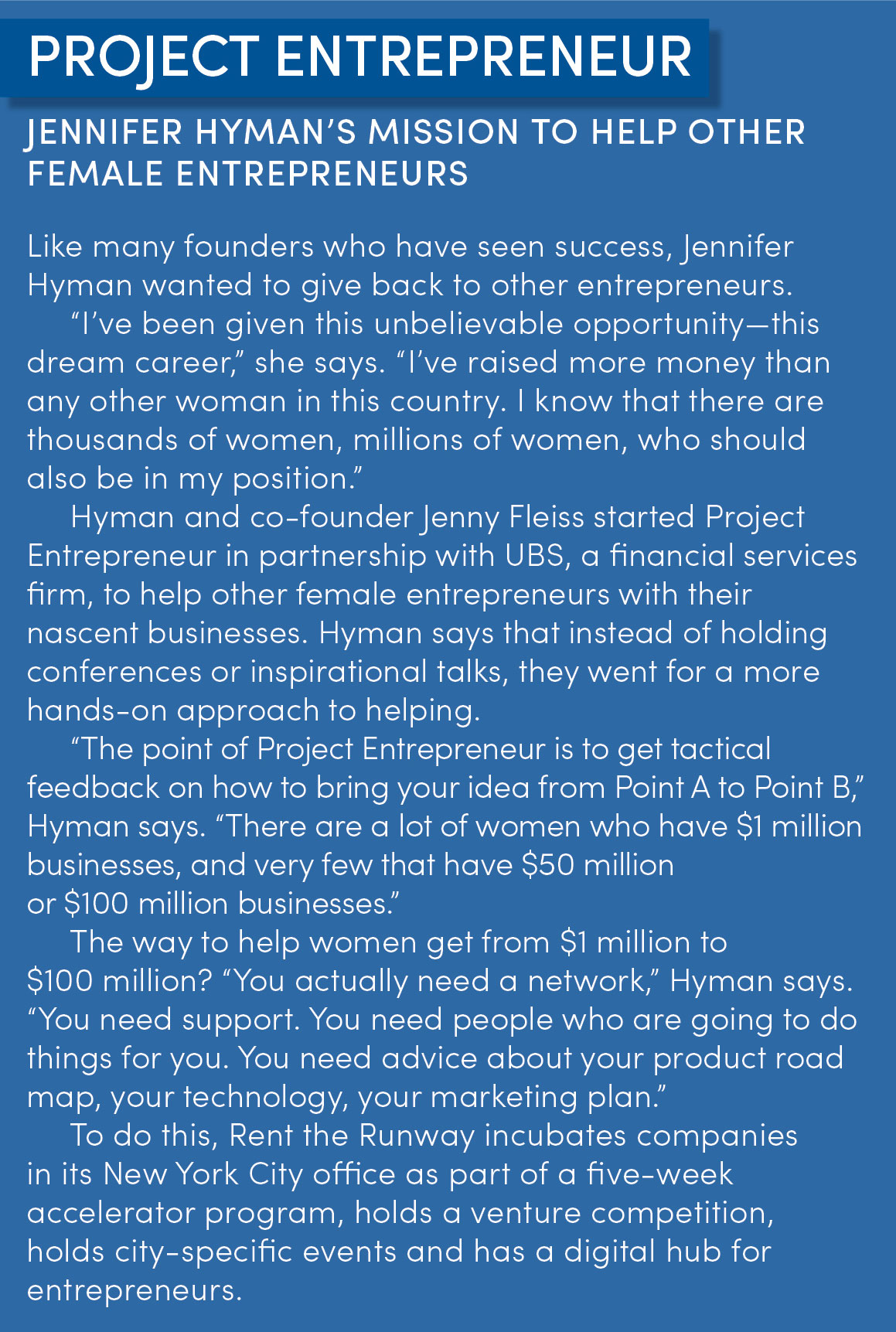
“Yes, we rent clothes, but what we really do is power a logistics system,” Hyman says. “We have technology. We have data scientists. To have those kinds of female leaders in a company that’s known for its logistics and its technology is awesome.” She says she hopes both women and men look at Rent the Runway as “an example of a place where you put smart women in charge and they can change the world.”
Related: 15 Traits of Unabashedly Successful Women
Rent the Runway is doing for clothes shopping what Uber did for transportation, what Netflix did for TV, what Blue Apron did for cooking. Hyman firmly believes that people today value access over ownership.
“We not only feel comfortable [with renting] as a generation, but we crave having and collecting experiences,” Hyman says.
Still, convincing women to wear used clothing isn’t easy. So many things can go wrong. What if the item has sweat stains? What if it’s become fuzzy? What if it looks ratty? Nobody knows who wore a rented dress or what was done in it.
But Rent the Runway has been able to flip that. Many women post their photos on the website or tag Rent the Runway on Instagram. They rent with the mindset that they’re in on a wonderful little secret, a life hack, and they want to share their savvy with the world. They take pride in renting.
“We were teaching women a new customer behavior of renting clothes—of wearing clothes other women had worn before,” Hyman says. “We were trying to not only convince them to do that, but convince women to feel that it was cool, and it was aspirational, and it wasn’t disgusting to be wearing clothing other women had worn.”
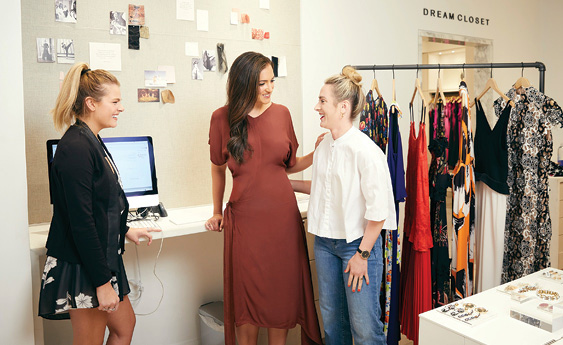
ROBERT ASCROFT
The company proved to women that renting isn’t something to be embarrassed about, that it’s a gateway to more clothing options. Women who have rented see that the dresses arrive in perfect condition, with absolutely no signs of wear and tear, sweat or grime. (In fact, Rent the Runway has the largest dry cleaning operation in the world.) If renters can’t tell their items have been worn, then nobody at the wedding they attend will be able to either.
Some of the styles on Rent the Runway have graced the site for years—a few since the website launched in 2009.
“The only thing that matters is something being new to the customer, not new off the runway,” Hyman says. “You want to wear something from Rent the Runway that you haven’t worn before. You don’t care, nor would you ever know, if something was from five minutes ago or five years ago.”
Bold Pioneer
In the morning, Hyman radiates pure confidence. She simultaneously commands the room and makes people feel at ease, making light, comfortable banter with anyone around. You know she’s in charge, but she doesn’t feel threatening. Everyone just calls her Jenn. And when she sees an employee try to duck out of a photo, Hyman calls her over and makes her pose. “Come here!” she tells the woman. “You’re gorgeous!”
Hyman is laid-back in general. She says she doesn’t stress over deadlines. She’s not competitive. She can’t remember the last time she made a list. And most of the time I’m around her, she seems pretty low-maintenance, especially by CEO standards. She has no problem, for example, taking a Yellow Cab instead of an Uber Black.

ROBERT ASCROFT
She’s also genuinely funny, like when she talks about accidentally naming her then 3-month-old daughter after the princess in Sleeping Beauty. Hyman’s sister, who sounds exactly like her over the phone, describes her with words like “warm” and “nurturing.”
But as the day progresses, Hyman goes from the eternal cool girl to the busy CEO. She starts checking the time more often, and reminding everyone within earshot that she has a pitch meeting later and people visiting. She cuts one of her afternoon sessions off early. And in the middle of an interview, she pulls out her laptop and stares at the screen, typing and scrolling.
Hyman grew up in New Rochelle, New York. Her father worked in international trade and finance, and her mother worked as the controller at a Pirelli tire subsidiary before quitting work to care full-time for Hyman’s sister with autism. Hyman gravitated toward the arts growing up—singing, dancing and acting. It wasn’t until she watched Oprah one day as a child that the idea of being an entrepreneur even crossed her mind.
“As a little kid, I would watch Oprah almost every day,” she says from her office. The room overflows with photos of family and friends. “Which is a strange thing for a child to do. But it was such an emotional show, and I feel like a good cry every day is good.”
One day, an episode featured Jessica DiLullo Herrin, the co-founder of WeddingChannel.com. Hyman was amazed at how the woman seemed so normal and happy. She had a husband, kids and social life while also running a company. “I was like, wow. It just put this seed in the back of my mind that being a female leader could be something I could do.”
Related: Strategies for Women to Rule the Workplace
After graduating from high school, she pursued a social studies degree at Harvard. After earning a bachelor’s, she took a job at Starwood Hotels and Resorts. There, she began dabbling in the experience economy and created the first-ever honeymoon registry. Wedding guests could purchase part of a couple’s honeymoon instead of getting them things they already had or didn’t need. After brief stints at WeddingChannel.com and IMG, she went back to Harvard to pursue her MBA.
“People are so uncomfortable with failing that it prevents them from taking the risks you need to have to pursue your best life.”
She married Ben Stauffer, in Montauk, New York, this September. She says he’s laid-back, caring and loving. When she talks about him, her joy feels sincere and abundant.

ROBERT ASCROFT
That part of her life hasn’t always been so simple. Several years ago, she canceled a previous engagement three days before the wedding.
Hyman isn’t one to skate through life comfortable and content, nor to shy away from difficult decisions.
“People are so uncomfortable with failing that it prevents them from taking the risks you need to have to pursue your best life,” she says. “That doesn’t just have to do with your career. People are scared of asking someone out on a date who they really care about, who they’re really into because they’re scared, What if that person says no? And, like, flip that. What if that person says yes? You have to take the risk to go after happiness.”
Social Activist
Hyman was live on the air last July, sitting in the CNBC studio in midtown Manhattan. She was wearing a slim, royal blue dress, with her hair in loose waves. She looked calm and focused, speaking effortlessly, as though she had prepared her story in her head, like it was something she’d been wanting to say for a while now.
“I was sexually harassed while building Rent the Runway several years ago,” she told the anchors. She explained that she was “propositioned, sent sexual text messages, harassed and threatened in person.”
She knew the audience would include a mix of colleagues, employees, business partners, potential investors and hundreds of thousands of total strangers. Hyman explained that she was going to remain quiet until the individual who harassed her called one of her board members and said she was being unresponsive. His questioning her abilities as a CEO prompted Hyman to show the vulgar text messages to her board, and come forward publicly with her story. She is keeping the individual’s identity private, she says, because the person is no longer an investor.
“I think it would bring unnecessary sensationalism to the issue given that he’s not investing anymore and therefore can’t do this to other women,” Hyman says.
Part of the reason she came forward to talk about sexual harassment was because she wanted to dispel the notion that it happens to women only in the very beginning of their careers. It happens at every stage and at every level, she says.
Related: 10 Powerful Ways to Stand Up for Yourself in Any Situation
“I had already raised tens of millions of dollars. I had a supportive board, I had a growing business, I had mentors, I had an awesome team to support me,” she says. “And still I was sexually harassed.”
Her board was supportive of her. But she says others haven’t been as fortunate. She points to her friend Katrina Lake, the CEO and founder of Stitch Fix, a clothing subscription service. Lake said that one of her investors was sexually harassing her and instead of trusting and helping her, the venture capitalist’s firm made her sign an agreement that she would not speak negatively of them.
“To hear that instead of supporting her, her own venture capitalists had tried to shut her down and quiet her from someone who was actually harming her, someone who was distracting her, someone who was threatening her… it is so backward.”
Forward Thinker
Although the majority of Rent the Runway’s business is online, the company has stores in New York, Chicago, Washington D.C., San Francisco and Woodland Hills, California. They also have a handful of in-person sample sales each year. Hyman says one big challenge the company faces moving forward is building more brand awareness.
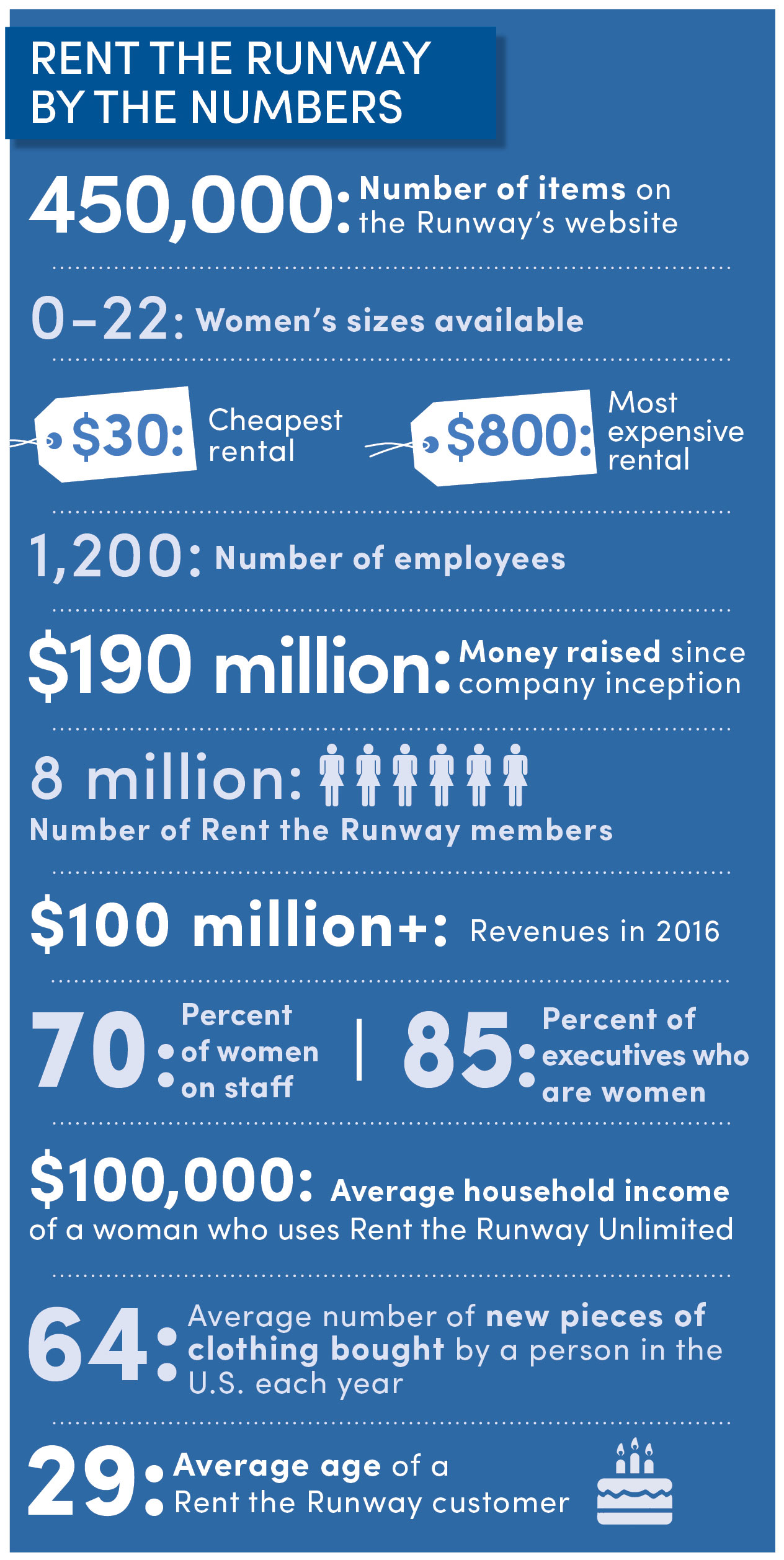
“I think there are a lot more women who know about us in New York or in San Francisco than know about us in Nashville or Minneapolis,” she says.
Hyman wholeheartedly believes the future of the company lies in Unlimited, and in consumers renting clothes on a day-to-day basis, not just for extravagant events.
“I think every woman in this country is going to have a subscription to fashion in the next 20 to 30 years.”
“This company is fundamentally about changing your relationship with your closet and making sure that every day you have new items rotating through your wardrobe,” she says. “I think every woman in this country is going to have a subscription to fashion in the next 20 to 30 years.”
Nearly everyone I spoke with called Hyman some form of the word visionary.
Brown, another team member at Rent the Runway, calls Hyman an innovator. “She has such an amazing vision for what we’re trying to achieve.”
Maureen Sullivan, COO of Rent the Runway, chose a different term. “The way I think about Jenn—and this was very clear from the very first meeting I had with her—is that she’s almost like a cultural anthropologist,” Sullivan says. “A lot of people talk about understanding consumer behavior, and that’s one thing, but you kind of have to be further ahead than that. You have to understand how people’s emotions and feelings are changing and then how the behavior changes.”
When it comes to her own emotions and feelings, Hyman says that at this point, she most values human connections and the time she gets to spend with the people she loves.
“My ideal day would be at the beach with my husband, daughter, tons of friends, all of my family members, in a huge dance party,” she says.
“With lots of Italian food.”
Related: The Habits of 12 Highly Successful Women
This article originally appeared in the December 2017 issue of SUCCESS magazine.




